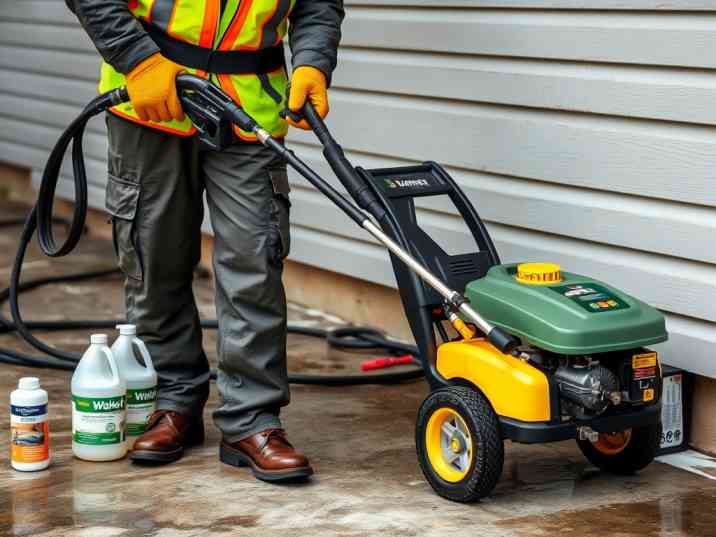In an era where environmental consciousness is no longer optional but a necessity, industries across the board are reevaluating their practices to align with sustainable principles. The power washing industry, traditionally associated with high water consumption and chemical-heavy cleaning agents, is undergoing a transformative shift toward eco-friendly solutions. This growing demand is driven by increasing consumer awareness, stricter environmental regulations, and the urgent need to mitigate the ecological impact of industrial and commercial activities. In this article, we will explore the factors fueling the rise of eco-friendly power washing solutions, their benefits, and how businesses and homeowners alike can embrace these innovations to meet modern expectations.
Why Eco-Friendly Power Washing Matters
Power washing is a highly effective method for cleaning exterior surfaces, from driveways and patios to commercial buildings and industrial facilities. However, traditional power washing methods often come at a significant environmental cost. Here’s why adopting eco-friendly alternatives is not only beneficial but essential:
1. Reducing Chemical Pollution
Conventional power washing frequently relies on harsh detergents and degreasers that contain phosphates, chlorine, and other toxic chemicals. These substances can seep into storm drains, contaminating rivers, lakes, and oceans, and harming aquatic life. Eco-friendly power washing solutions utilize biodegradable, non-toxic cleaning agents that break down naturally without leaving harmful residues.
2. Conserving Water Resources
Water scarcity is a pressing global issue, and power washing traditionally consumes vast amounts of water. According to estimates, a standard pressure washer can use up to 2-4 gallons of water per minute. Eco-friendly systems incorporate water-saving technologies, such as low-flow nozzles and water recycling systems, to minimize waste and conserve this precious resource.
3. Lowering Carbon Emissions
Gas-powered pressure washers contribute to greenhouse gas emissions, exacerbating climate change. Transitioning to electric or battery-operated models reduces reliance on fossil fuels and promotes cleaner energy usage. This shift is particularly important in urban areas where air quality is a concern.
4. Meeting Consumer Expectations
Today’s consumers are more informed and environmentally conscious than ever before. They actively seek out businesses that prioritize sustainability and are willing to pay a premium for eco-friendly services. By adopting green practices, power washing companies can attract a loyal customer base while contributing to a healthier planet.

Factors Driving the Demand for Eco-Friendly Power Washing
Several key factors are propelling the demand for sustainable power washing solutions. Understanding these drivers provides insight into why this trend is gaining momentum.
1. Increasing Environmental Awareness
The global push for sustainability has led individuals and businesses to reassess their environmental impact. Campaigns promoting eco-conscious living, coupled with widespread media coverage of climate change and pollution, have heightened awareness about the importance of adopting green practices. As a result, consumers are demanding services that align with their values.
2. Stricter Environmental Regulations
Governments worldwide are implementing stringent regulations to curb pollution and protect natural resources. For example, many municipalities now require businesses to use biodegradable cleaning agents and properly dispose of wastewater. Non-compliance can result in hefty fines, making it imperative for power washing companies to adopt eco-friendly practices.
3. Technological Advancements
Innovations in power washing equipment and cleaning agents have made it easier than ever to go green. Modern machines are designed to reduce water and energy consumption, while plant-based detergents offer powerful cleaning capabilities without harming the environment. These advancements make eco-friendly solutions both accessible and cost-effective.
4. Corporate Social Responsibility (CSR) Initiatives
Businesses are increasingly incorporating CSR into their operations to demonstrate their commitment to sustainability. Adopting eco-friendly power washing practices allows companies to showcase their dedication to environmental stewardship, enhancing their brand reputation and competitive edge.
Benefits of Eco-Friendly Power Washing Solutions
Switching to eco-friendly power washing offers numerous advantages for businesses, homeowners, and the environment. Below, we delve into the key benefits:
1. Enhanced Brand Image
For businesses, embracing sustainability is a powerful way to differentiate themselves in a crowded market. Customers are more likely to support companies that share their values, particularly when it comes to protecting the planet. Eco-friendly power washing positions your business as a responsible and forward-thinking entity.
2. Cost Savings
While the initial investment in eco-friendly equipment and cleaning agents may be higher, the long-term savings are substantial. Water-efficient systems reduce utility bills, and durable, biodegradable detergents minimize the need for frequent replacements. Additionally, businesses that comply with environmental regulations avoid costly fines and penalties.
3. Improved Health and Safety
Traditional cleaning agents often emit harmful fumes that can irritate the skin, eyes, and respiratory system. Biodegradable and pH-neutral formulas used in eco-friendly power washing are safer for workers, clients, and the surrounding environment. This ensures a healthier workplace and peace of mind for everyone involved.
4. Contribution to Global Sustainability Goals
By reducing water waste, minimizing chemical pollution, and lowering carbon emissions, eco-friendly power washing contributes to broader sustainability goals. Every small step taken by businesses and individuals adds up to create a significant positive impact on the planet.
Key Components of Eco-Friendly Power Washing
To successfully implement eco-friendly power washing solutions, it’s essential to focus on three main components: equipment, cleaning agents, and operational practices.
1. Sustainable Equipment
The choice of equipment plays a pivotal role in minimizing the environmental footprint of power washing. Here are some eco-friendly options to consider:
- Electric Pressure Washers: Unlike gas-powered models, electric washers produce zero emissions and operate quietly. They are ideal for residential and urban applications.
- Battery-Powered Washers: Portable and emission-free, these washers are perfect for remote locations or projects without access to electrical outlets.
- Low-Flow Nozzles: These nozzles reduce water consumption by focusing the spray pattern and increasing pressure efficiency. They are particularly useful for large-scale projects like parking lot cleaning.
- Water Recycling Systems: Advanced systems capture and filter wastewater for reuse, drastically cutting down on water waste. This technology is especially beneficial for industrial and commercial applications.
2. Biodegradable Cleaning Agents
Eco-friendly cleaning agents are a cornerstone of sustainable power washing. Here are some popular options:
- Plant-Based Detergents: Derived from natural ingredients, these detergents break down organic matter without leaving harmful residues. They are safe for plants, animals, and humans.
- Oxygenated Cleaners: These cleaners release oxygen molecules to lift dirt and grime, making them highly effective against mold, mildew, and algae. They are non-toxic and biodegradable.
- pH-Neutral Formulas: Designed to be gentle on surfaces, pH-neutral cleaners prevent corrosion and discoloration while being safe for the environment.
- Enzyme-Based Solutions: Enzymes naturally break down organic contaminants like grease and oil, making them an excellent choice for industrial settings.
3. Environmentally Conscious Operational Practices
Beyond equipment and cleaning agents, businesses can implement operational strategies to further reduce their environmental impact:
- Proper Waste Disposal: Collect and dispose of wastewater responsibly to prevent contamination of local water sources. Use filtration systems to remove debris and chemicals before releasing water back into the environment.
- Targeted Cleaning: Focus on specific problem areas rather than over-washing entire surfaces. This approach conserves resources and minimizes unnecessary wear and tear.
- Regular Maintenance: Keep equipment in top condition to maximize efficiency and extend its lifespan. Well-maintained machines consume less energy and water.
- Training Employees: Educate staff on eco-friendly practices, including the proper use of equipment, selection of cleaning agents, and adherence to waste management protocols.
Case Studies: Success Stories of Eco-Friendly Power Washing
To illustrate the effectiveness of sustainable power washing solutions, let’s examine two real-world examples:
1. A Hospitality Chain’s Green Initiative
A luxury hotel chain implemented eco-friendly power washing across its properties to maintain pristine exteriors while adhering to its sustainability goals. By switching to plant-based detergents and low-flow nozzles, the chain reduced water usage by 30% and eliminated chemical runoff. Guests praised the initiative, leading to increased bookings and positive reviews.
2. An Industrial Facility’s Water Recycling System
An automotive manufacturing plant installed a water recycling system for its power washing operations. The system captured and filtered wastewater, allowing the facility to reuse up to 70% of its water supply. This innovation not only reduced costs but also earned the company recognition as a leader in sustainable manufacturing.

Challenges and How to Overcome Them
While eco-friendly power washing offers numerous benefits, businesses may encounter challenges during implementation. Here’s how to address common obstacles:
1. Higher Initial Costs
Investing in eco-friendly equipment and cleaning agents can be expensive. To mitigate this, consider leasing equipment initially or applying for green business grants and incentives.
2. Limited Availability of Products
Some regions may lack access to biodegradable detergents or advanced water recycling systems. Partnering with suppliers who specialize in sustainable products can help overcome this hurdle.
3. Resistance to Change
Employees or clients accustomed to traditional methods may resist adopting new practices. Provide training sessions and demonstrate the long-term benefits of eco-friendly solutions to gain buy-in.
Conclusion
The growing demand for eco-friendly power washing solutions reflects a broader societal shift toward sustainability. By adopting green practices, businesses and homeowners can reduce their environmental impact, comply with regulations, and appeal to eco-conscious consumers. From investing in energy-efficient equipment to using biodegradable cleaning agents, every step toward sustainability contributes to a healthier planet and a stronger bottom line.
As consumer demand for eco-friendly services continues to grow, those who embrace these solutions will position themselves as leaders in their industries. By implementing the strategies outlined in this article, you can transform your power washing operations into a model of environmental responsibility while achieving lasting success.




